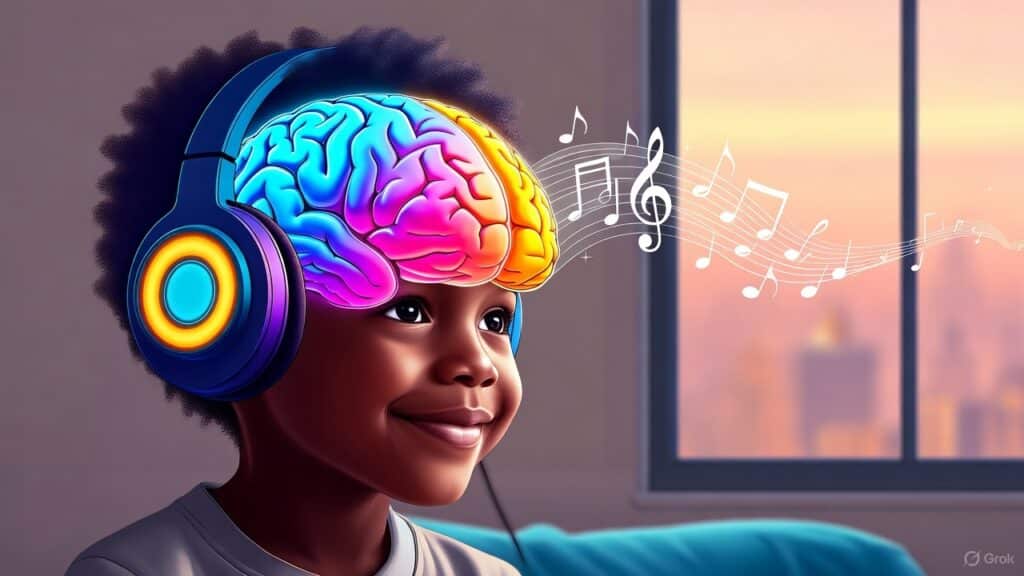Music is everywhere around us. From the songs we hum in the shower to the beats that make us dance, music has a magical power. But have you ever wondered what happens inside our brain when we listen to music? Why do some tunes make us happy, others make us cry, and some even help us study better? Let’s dive into the fascinating world of music and the brain!
What Happens in Our Brain When We Hear Music?
When you put on your headphones or listen to your favorite song, your ears send sound signals to the brain. These signals travel very quickly, and suddenly, your brain starts to react. Different parts of the brain light up as if a party has begun inside your head!
- Auditory Cortex – This part helps us understand the sound and rhythm.
- Hippocampus – It connects music with memory. That’s why a song can remind you of your first day at school or a fun family trip.
- Amygdala – This controls emotions, so it makes you feel happy, sad, or even scared depending on the music.
- Motor Cortex – This makes your body move with the beat. Ever tapped your feet or clapped your hands without thinking? That’s your motor cortex at work!
So, music doesn’t just stay in your ears – it travels through your whole brain and affects your feelings, thoughts, and even actions.

Why Does Music Make Us Feel Emotions?
Have you ever cried while listening to a slow, sad song or felt super excited with a fast beat? Music is like a language of emotions. Scientists say music can trigger the release of dopamine, also known as the “happy chemical.”
- Fast beats = excitement and energy.
- Slow tunes = calmness and relaxation.
- Loud music = thrill and intensity.
- Soft music = peace and comfort.
That’s why lullabies help babies sleep, and energetic songs pump up athletes before a big game.
Music and Memory – Why Do Songs Stay in Our Head?
You might forget what you ate last week, but you can still remember the lyrics of your favorite song from years ago. Why? Because music is deeply connected to memory.
When you learn a song, your brain stores it in the hippocampus. That’s why people with memory problems, like Alzheimer’s disease, can still remember old songs even when they forget names or faces. Music works like a time machine, bringing back memories instantly.
Can Music Make Us Smarter?
Yes, music can actually help us learn! Scientists call this the “Mozart Effect”, which means listening to music, especially classical music, can improve focus and brain power.
- Music helps in math – because rhythm and beats follow patterns.
- Music helps in language learning – songs make it easier to remember new words.
- Music helps in creativity – it opens the brain to new ideas.
That’s why many students listen to soft background music while studying. It’s like giving your brain a little helper.
Music and the Brain in Everyday Life
Let’s look at how music affects us in different situations:
- While Studying – Calm music can improve focus and reduce stress.
- While Exercising – Fast beats boost energy and make workouts more fun.
- When Feeling Sad – Music can lift your mood and make you feel better.
- Before Sleep – Gentle tunes relax the brain and help with better sleep.
Music and the Brain of Kids
Kids’ brains are especially sensitive to music. Learning to play an instrument or singing can help children grow smarter and more confident. Studies show that kids who learn music often do better in school, have better memory, and become good problem solvers.
Why Does Music Make Us Want to Dance?
Sometimes, you just can’t stop moving when you hear a catchy beat. That’s because music activates the motor cortex and also releases endorphins, the “feel-good” hormones. This combination makes you want to move your body, clap, or even jump around. Dancing with music is not just fun – it’s also healthy for the brain and body!
Music Therapy – Healing with Music
Doctors and therapists use music therapy to help people who are stressed, anxious, or even sick. Music can slow down the heartbeat, lower blood pressure, and reduce pain. For children, music therapy can improve speech, learning, and emotional growth.
Music is like medicine, but without the bitter taste!
Do Animals Also React to Music?
Yes! Animals also have musical brains. Cows produce more milk when listening to soft music, and some birds sing in rhythm. Even dogs and cats can become calmer with gentle tunes. Music is truly a universal language – not just for humans but for all living beings.
- Your heartbeat can sync with the rhythm of the music you are listening to.
- People who play instruments often have bigger and stronger brain connections.
- Music can reduce pain – that’s why hospitals sometimes play soothing music.
- Your brain predicts what the next note in a song will be – that’s why surprises in music excite us.
- The human brain loves repetition in music – that’s why catchy songs get “stuck” in your head.
Conclusion
Music is not just entertainment – it’s brain magic. It makes us feel emotions, helps us remember, makes us smarter, and even heals us. Whether you’re listening to your favorite pop song, a classical melody, or a simple lullaby, your brain is always dancing with the rhythm.
So, next time you put on your headphones, remember: you’re not just hearing music – your brain is enjoying a concert of science and magic!